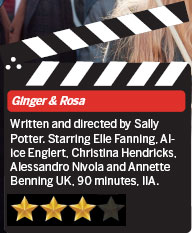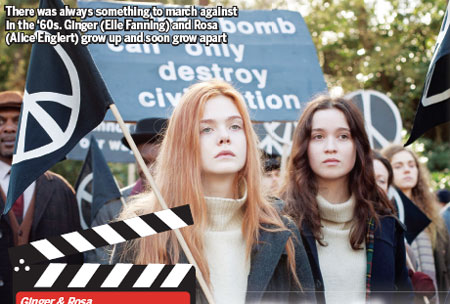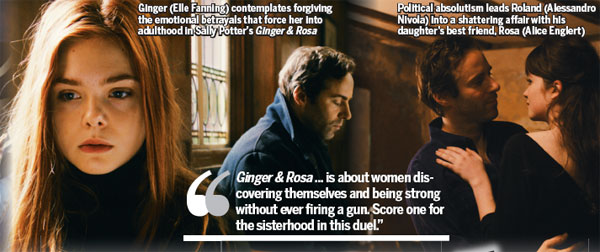Girls, girls, girls
Updated: 2013-12-13 06:42
By Elizabeth Kerr(HK Edition)
|
|||||||||
Young women grab the spotlight in two films that examine very different ways to come of age. Elizabeth Kerr reports.
The complaint about a lack of "strong female characters" is one that has been echoed hundreds of times over in these pages and dozens of others going back as far as the 1974 publication of Molly Haskell's seminalFrom Reverence to Rape. It's sad to think that not much has changed in the intervening four decades. Sure, there are "strong" women in movies now, but producers too frequently confuse being physically strong with being well written and fully formed. Ellen Ripley's post-Alienlegacy has simply meant more women wielding weaponry and landing punches. There's more to it than that. Adding insult to injury, women are still painted with the same tired brushes; dressing up punishment as thought-provoking, topical drama or playing it as comedy is still punishment for behaviors that are, ahem, inappropriate for the fairer sex - behaviors like opting out of motherhood, professional ambition, exceeding size 6 and having sex.
Women tend to paint women better, but that certainly doesn't mean men out there can't do it. John Cassavetes, Pedro Almodvar and Ang Lee are as adept with female characters as Jane Campion, Kathyrn Bigelow and Claire Denis. The economics of modern mainstream filmmaking simply means they don't bother. And shoehorning a female character into a narrative that doesn't demand one is just as bad - with potentially adverse effects. Into this climate comes Sally Potter's below-the-radarGinger & RosaandAbdellatif Kechiche's already notoriousBlue is the Warmest Colour, two films all about women discovering themselves and being strong without ever firing a gun. Score one for the sisterhood in this duel.
In Potter's latest, the director (Orlando,The Tango Lesson) crafts a coming-of-age story that is more focused, with a more complete character than most. It is the early 1960s in London. Seventeen-year-old Ginger (Elle Fanning) and her best friend Rosa (Alice Englert, Campion's daughter) are beginning to assert their independence, even though they may not fully understand it. Ginger idolizes her conscientious objector father Roland (Alessandro Nivola) and resents all that her mother Natalie (Christina Hendricks) represents. But the way we cope, manage and navigate the world as adults is vastly different from what Ginger thinks it is. She develops a fanatical devotion to the Ban the Bomb movement with the Cuban Missile Crisis looming, which serves as the crutch that helps her deal with what she's really afraid of.
InBlue, Kechiche has also crafted a coming-of-age story of sorts, one about 17-ish Adle (Adle Exarchopoulos), and her defining, youthful romance with the slightly older Emma (La Seydoux).Kechiche tracks the women's relationship from the apprehensive first steps, with Adle coming to grips with her lesbianism, the playful, lusty phase of mutual discovery, the familiar, safe stage, free of illusion, and finally collapse. It's the oldest story in the book, except it's girl meets girl, not boy, and girl doesn't get girl back.
Potter has two things in her favor inGinger & Rosa: the first is a carefully constructed, multi-layered lead who we may not like from time to time but who we always understand. Ginger's gradual maturity is happening at a time in history defined by fear, and it is fear that informs many of Ginger's actions. She's not yet in a position to appreciate the decisions Natalie makes, and accuses her of all manner of ignorance and weakness. When she moves in with Roland, an idealist that served prison time for his beliefs, she thinks she's found her intellectual role model. Her parents' friends - visiting American academic types (Annette Benning, Oliver Platt and Timothy Spall) - also validate her arguments and treat her like an adult. But when Rosa and Roland begin an affair, Ginger's inability to cope with the emotional betrayal and attempts to understand the where and why of the social lines we tacitly agree not to cross, are the basis of a rude awakening that she can't hide from, by joining disarmament marches.

Second, Potter's choice to focus the action around a single moment in a turbulent decade everywhere savesGinger & Rosafrom devolving into a sprawling melodrama with a Greatest Hits of the '60s soundtrack that has no idea what it wants to say. Potter (and Fanning as the nuanced Ginger) is clear on what she wants to say, and does so eloquently and believably, despite a wobbly coda that feels out of place.
Twice as long and about half as thought provoking is this year's Palme d'Or winner. There's a PhD thesis inBlue is the Warmest Colour, and the debate over whether or not it's porn, transcendent, ground-breaking or just a bratty child screaming for attention, has raged since May. The short version? The sex scene everyone's talking about runs around 11 minutes, not half an hour, it's not terribly erotic and I have to come down on the side of the detractors. It is very much in line with how men illustrate female pleasure. There is an element of male gazing that lingers over the Big Scene, thoughKechiche conceals it well. It's gaze-y for sure (Exarchopoulos and Seydoux are both gorgeous size 6's, neither is lesbian), but not drool-y.
But the measured and naturalisticBlueis really about the birth, life and death of a relationship. Simple. And though it's immaculately detailed and Exarchopoulos and Seydoux clearly commit to the characters (amid a great deal of hostility according to both) there's nothing truly innovative about the way the romance unfolds. At various stages, petty jealousy, work stresses, and unwelcome former lovers all rear their ugly heads, and sex becomes a barometer for where the women stand with each other. By the time the fourth sequence rolls around, however, it starts to feel drool-y.
The moments whenBlueworks, it really works - like an awkward party where Emma introduces Adle to her crowd, another with Adle's oblivious parents, a quiet picnic where they discover there might be something between them, Emma's response to Adle's infidelity. Seydoux is the more engaging of the two, as her comfort with herself and her worries about her career as an artist are just parts of a complete whole that Seydoux juggles deftly; as the emerging Adle,Exarchopoulos spends a lot of time in tears. This isBrokeback Mountainwith women, and we've all been there. Done that.
Ginger & Rosaopened in Hong Kong on December 19.Blue is the Warmest Colouropens January 2.


(HK Edition 12/13/2013 page7)